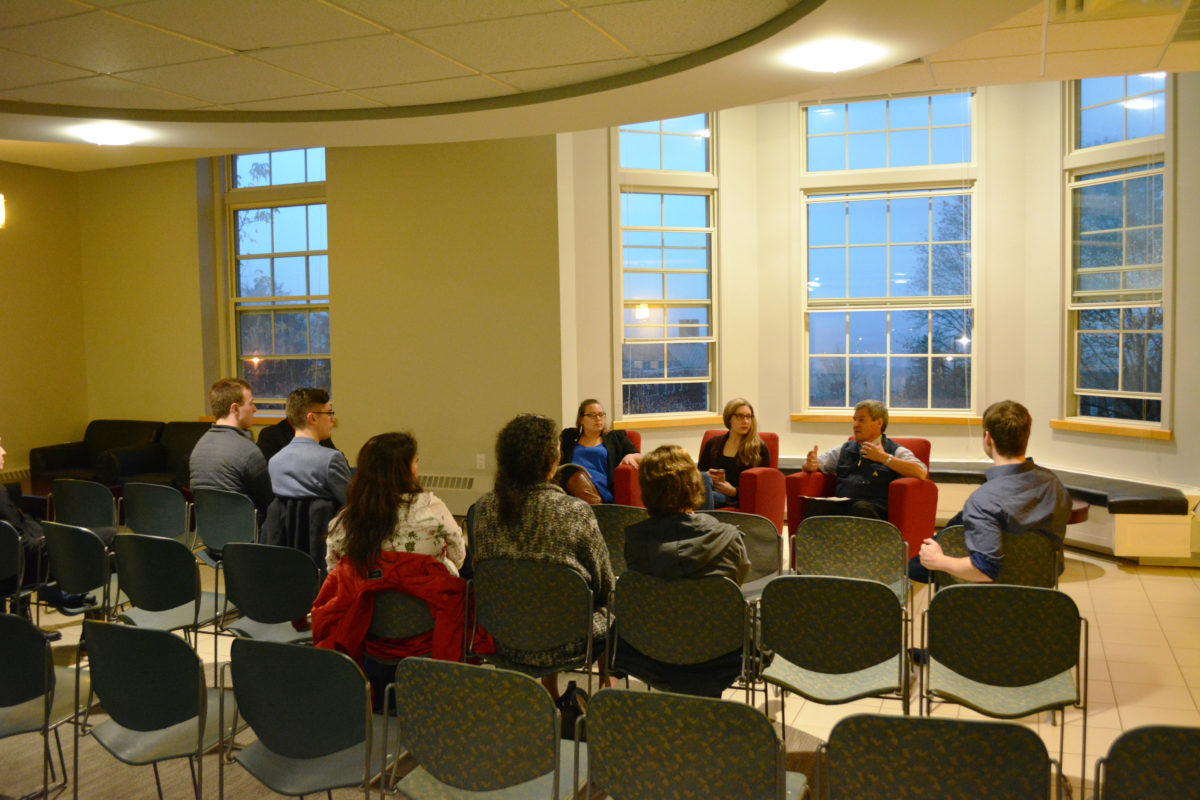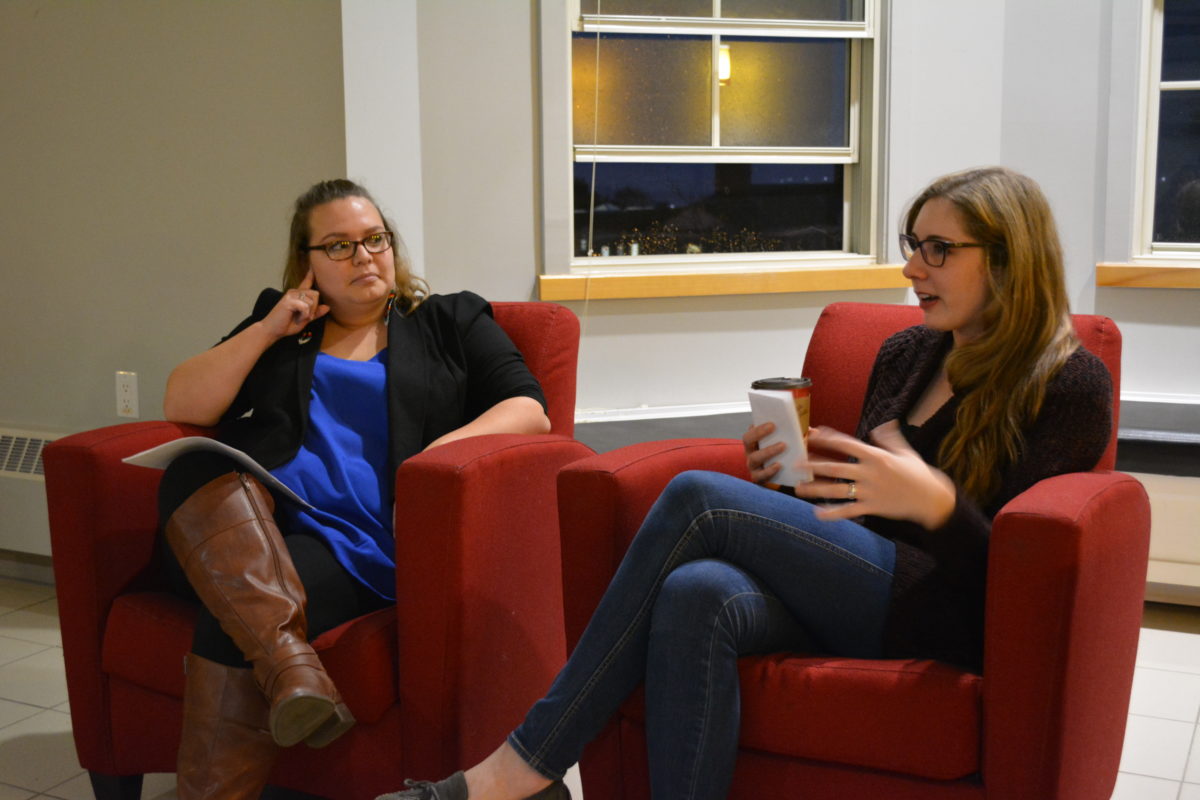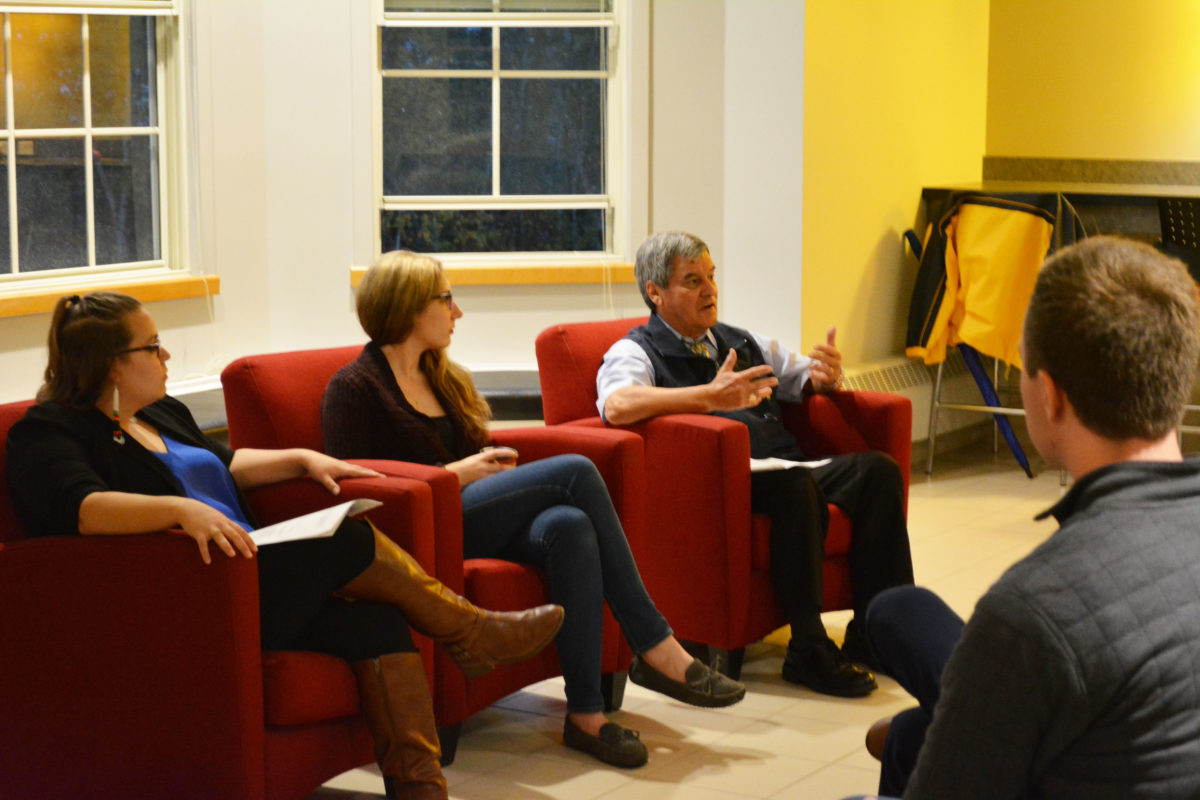St. Thomas University Students’ Union’s Indigenous and Reconciliation Committee held its first panel discussion about Canada 150 on Oct. 25.
The three panelists were Graydon Nicholas, former lieutenant governor of New Brunswick and the endowed chair in native studies at STU; Amanda LeBlanc, operational director of Under One Sky Friendship Centre, an Aboriginal social services and community centre; and Mandy Richard, a fourth-year student and member of the Indigenous and Reconciliation Committee (IRC).
The event began with an opening prayer from STU’s elder-in-residence Miigam’agan.
IRC chair and STUSU’s Indigenous representative Alexa Metallic then gave a message of solidarity for Masuma Khan, vice president of Dalhousie University’s student union. Khan is facing disciplinary action after recommending the university not celebrate Canada 150 and posting about it on Facebook after it was rejected.
“Her concern for Indigenous interests is appreciated here at St. Thomas and it is with the help of allies like her that we will be able to move forward toward reconciliation,” Metallic said.
The first question put to the panel was whether they agreed with a statement Justin Trudeau gave about Canada 150, recognizing the anniversary of confederation is not a celebration for all.
“Indigenous peoples in this country have faced oppression for centuries. As a society, we must acknowledge and apologize for past wrongs and chart a path forward for the next 150 years, one in which we continue to build our nation to nation, Inuit, Crown and government to government relations with the First Nations, Inuit and Metis nation,” Trudeau said.
Nicholas answered first. He said if Trudeau really wants to celebrate a Canada that is working toward reconciliation, “he’s got to go back and say, ‘How do we right these relations?’”
For Nicholas, that means going back to the original treaties between Europeans and Indigenous people for judicial interpretation. The struggle is, Nicholas said, is “the law in this country doesn’t understand that Indigenous concept of nation to nation.”
To achieve reconcilation, Nicholas said Canada’s courts have to be ready to understand the historical facts and open their horizons to different perspectives.
“Are judges in this country open to concepts that they didn’t learn about in law school?” he asked.
Nicholas mentioned the United Nations Declaration on the Rights of Indigenous Peoples cites self-determination as a right. Canada was one of four nations who declined to sign the declaration.
When asked if there was a model Canada could reference in building a nation-to-nation relationship with Indigenous people, Nicholas gave the Navajo nation in the U.S. as an example. He said the Navajo nation has its own territory, legislature, government and court system, and the Navajo government makes reciprocal agreements with United States state and federal governments.
>>>
LeBlanc and Richard both said when they originally heard Trudeau’s statement they were hopeful, but hope was soon squashed when the government announced a half-billion-dollar budget for Canada Day activities around the country.
“They should have focused it on, ‘We’ve been here for 150 years. We’ve done all these negative things, but were going to spend half a billion dollars fixing some of these issues and building these relationships,’” LeBlanc said.

She pointed out how immediately after the budget announcement, there were stories about Indigenous communities without clean drinking water and underfunded healthcare and education programs for Indigenous people.
LeBlanc said she would have liked to see the government put half a billion dollars into revamping curriculums across Canada, teaching everyone the true history of Canada’s relations with Indigenous people.
Richard agreed.
“That money could have been used for so many other great things,” she said.
“I still remember sitting at my work desk and coming across this article about so much money in Toronto for a rubber duck. A rubber duck, so people could take selfies with this rubber duck that cost them a lot of money.”
Richard said while Trudeau talks about charting a path for the next 150 years, “we as Indigenous people have been saying what this path is for a very long time.”
She said actions speak louder than words, and it’s time for the government to put money where their mouth is.
“I think the general population, outside of institutions and politics, people, they are making much bigger strides toward what true reconciliation should be, and taking the time not just to learn about Indigenous histories, but really look in within themselves and realize their prejudice, their colonial ways of thinking, and that’s something that I’m happy about, because I do see that shift,” Richard said.
LeBlanc added the Truth and Reconciliation Commission’s 94 calls to action have been a successful step forward.
“That is what has given us a platform to spark these grassroots movements and hold [the government] accountable to something.”
LeBlanc said the disconnect between government officials and the history, challenges and needs of Indigenous people in Canada have led to ineffective policies and the successful initiatives have been grassroots movements started by Indigenous people.
The TRC is not just a document, Richard added.

“There is a moral and legal obligation to implement these calls to action.”
>>>
The second question was whether you can celebrate Canada 150 and still respect Indigenous rights.
“This is a difficult question to answer because the answer isn’t black and white,” Richard said.
The answer depends on what is meant by respecting Indigenous rights, she said, and whether respect comes out of an understanding of the history and sovereignty of Indigenous people.
Richard said she chose not to celebrate Canada 150, but not in protest, and she doesn’t condemn anyone who chose to celebrate.
When asked what non-Indigenous people can do to become good allies, LeBlanc said it’s important to give yourself enough credit for what you know and share what you do know.
“You’ve just started your journey of learning the issues,” LeBlanc said.
She also said not to be discouraged when you come across people who don’t want to share their stories or history immediately.
“I think that’s a burden that the government has put on Aboriginal peoples, to share the knowledge and for us to go out and splash out culture and teach everybody.”
LeBlanc recommended advocating for mandated education on Aboriginal peoples’ history and culture and asking how to support Indigenous-led initiatives.
Richard added that simply asking the question ‘How do I be a good ally?’ is a good first step.
“I think another step is to allow yourself to be open and vulnerable and accept things that are uncomfortable.”

